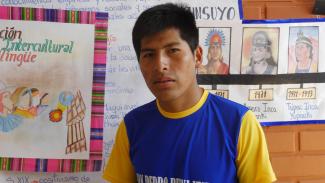Education
Bilingual teacher training

Today, Quechua is on the timetable. “Students like David are a big help – he speaks flawless Quechua and I sometimes ask him when I am not sure about the correct pronunciation,” says teacher Christina Prado.
David comes from a village and speaks only Quechua with his parents. He did not learn Spanish until he started school. Quechua is a compulsory subject for future teachers because the pluricultural Bolivian state wants every child to be addressed at school in his or her mother tongue (see article). But those studying to become teachers have only four language training lessons a week – not enough to learn an indigenous language properly. Nonetheless, as teachers, they will even be expected to teach other subjects in Quechua once they begin to work in schools. “Lessons are conducted in Quechua in rural primary schools but as soon as the subjects get harder, most teachers switch to Spanish,” David explains.
He knows that more needs to be done for the concept of bilingual intercultural education to work in practice. He says: ”It is not just about teaching Quechua but about giving the two languages equal status.”
The mere fact that fellow students learn Quechua, is a big step forward in David’s eyes: “I used to be embarrassed about speaking my language. Today I speak it with pride!” David’s career plan is to get his teaching qualifications and then go back to his home village and teach at the primary school that he attended himself. Most of the future teachers he is studying with, however, will probably go to city schools and teach in Spanish. (lv/cp)












